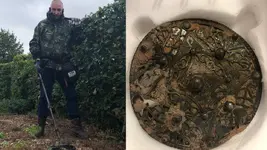garryson
Bronze Member
- #1
Thread Owner
A metal detectorist who found a rare early-medieval silver brooch has said it was his most "incredible" find ever.
The Trewhiddle-style brooch found on farmland at Cheddar in Somerset features detailed interlace decorations with animals thought to be peacocks.
Detectorist Iain Sansome said it was "incredible" to think the treasure used as a symbol of wealth and high status was last held 1,000 years ago.

Read more: https://www.bbc.com/news/uk-england-somerset-58552915
The Trewhiddle-style brooch found on farmland at Cheddar in Somerset features detailed interlace decorations with animals thought to be peacocks.
Detectorist Iain Sansome said it was "incredible" to think the treasure used as a symbol of wealth and high status was last held 1,000 years ago.
Read more: https://www.bbc.com/news/uk-england-somerset-58552915




